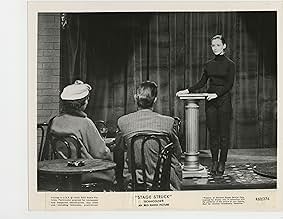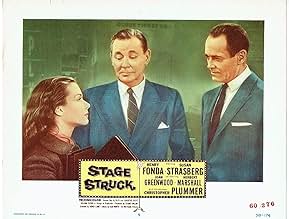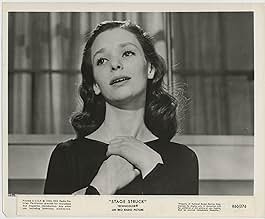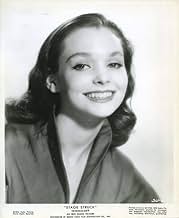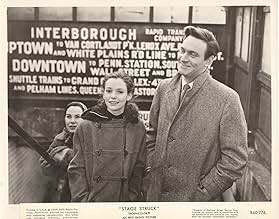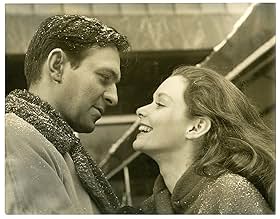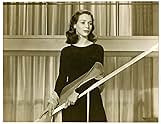Una joven llega a Nueva York decidida a convertirse en una gran estrella teatral, pero descubre que su objetivo puede no ser tan fácil de alcanzar como esperaba.Una joven llega a Nueva York decidida a convertirse en una gran estrella teatral, pero descubre que su objetivo puede no ser tan fácil de alcanzar como esperaba.Una joven llega a Nueva York decidida a convertirse en una gran estrella teatral, pero descubre que su objetivo puede no ser tan fácil de alcanzar como esperaba.
- Dirección
- Guionistas
- Elenco
Pat Harrington Sr.
- Benny
- (as Pat Harrington)
Pat Englund
- Gwen Hall
- (as Patricia Englund)
Merle A. Ashley
- Minor Role
- (sin créditos)
Dario Barri
- Handsome Young Man
- (sin créditos)
Rolly Bester
- Minor Role
- (sin créditos)
Leon Bibb
- Guitar Player
- (sin créditos)
- Dirección
- Guionistas
- Todo el elenco y el equipo
- Producción, taquilla y más en IMDbPro
Opiniones destacadas
Strasberg gives what is perhaps one of the worst performances by an actress in an "A" film. Her acting is jaw-droppingly terrible, and "over-the-top" is too kind of a phrase. She obviously took her father's instruction to heart - he being Lee Strasberg of the Actor's Studio. The "waiting-for-the-reviews" party during the first thirty-minutes of the film actually contains a cring-worthy rendition of the famous balcony scene from "Romeo & Juliet."
Of course, director Lumet has a tendency to allow his performers to chew the scenery. Fonda is an exception, though. He provides his usual subdued interpretation. Plummer comes across quite nicely, as well.
However, the "romantic" conclusion is totally ridiculous, as there is zero chemistry between the characters who finally end up with one another.
I forced myself to watch this film till the end, but it wasn't easy. Not surprisingly, Strasberg's career eventually settled into "B" movies, and hammy TV roles.
Of course, director Lumet has a tendency to allow his performers to chew the scenery. Fonda is an exception, though. He provides his usual subdued interpretation. Plummer comes across quite nicely, as well.
However, the "romantic" conclusion is totally ridiculous, as there is zero chemistry between the characters who finally end up with one another.
I forced myself to watch this film till the end, but it wasn't easy. Not surprisingly, Strasberg's career eventually settled into "B" movies, and hammy TV roles.
Susan Strasberg plays Eva Lovelace, an aspiring Broadway actress possessed by some theatric god that directs her to precisely pronounce and deliver each and every word with impeccable timing. She comes to New York by way of Vermont where she performed in numerous summer stock productions and her persistence and personality capture the attention of playwright Joe Sheridan (Peter Cushing) and actor Robert Marley Hedges (Herbert Marshall). Producer Lewis Easton (Henry Fonda) tells her to study the Actor's Studio (would that be Lee Strasberg's school of method acting?) but she doesn't want to dilute her gift by having it altered in an acting school. Strasberg's performance makes and at times almost breaks this picture. It manages to annoy and captivate, often simultaneously. When she delivers Juliet's lines on the stairway of Easton's swank townhome after drinking four or five glasses of Champaigne in front of a party of theater luminaries, it knocks you out. It is as if Eva Lovelace is playing Susan Strasberg. In any event, she (Strasberg) has an unusual beauty and sincerity that come shining through in spite of the theatrics.
Although Susan Strassberg has been unfairly compared to Katharine Hepburn from the original Morning Glory, it's not quite a fair comparison. Forgetting that there is no one like Hepburn, Strassberg does do a decent job with the material given in Stage Struck. The problem is that the story has been changed and not for the better.
Romance was added to this production and it weakens the basic story of a young girl who is so single minded in her determination to be a success in the theater. The characters played by Adolphe Menjou and Douglas Fairbanks, Jr. in Morning Glory are now played by Henry Fonda and Christopher Plummer. The producer and the playwright now engage in a rivalry for Strassberg which weakens the story.
In the original Morning Glory it's made clear from the beginning that Menjou is a love 'em and leave 'em type and he's really got no interest in Hepburn in that direction as he sees she's not the type. Pipe smoking Fairbanks after Hepburn makes good would like to get something going with her, but she's into her art first and for always.
But Fonda and Plummer have a civilized rivalry for Strassberg and the story is which one will she choose. That I'm not telling.
Stage Struck has some nice location shots of New York in the late Fifties, Broadway and the Greenwich Village area and a bit of Park Avenue. Joan Greenwood is here as the star who falters and allows Strassberg her big break. Greenwood's quirky personality that British films utilized so well is strangely missing here. Herbert Marshall is great as the older actor that C. Aubrey Smith played in Morning Glory.
Stage Struck is a nice film, but definitely a come down from Morning Glory.
Romance was added to this production and it weakens the basic story of a young girl who is so single minded in her determination to be a success in the theater. The characters played by Adolphe Menjou and Douglas Fairbanks, Jr. in Morning Glory are now played by Henry Fonda and Christopher Plummer. The producer and the playwright now engage in a rivalry for Strassberg which weakens the story.
In the original Morning Glory it's made clear from the beginning that Menjou is a love 'em and leave 'em type and he's really got no interest in Hepburn in that direction as he sees she's not the type. Pipe smoking Fairbanks after Hepburn makes good would like to get something going with her, but she's into her art first and for always.
But Fonda and Plummer have a civilized rivalry for Strassberg and the story is which one will she choose. That I'm not telling.
Stage Struck has some nice location shots of New York in the late Fifties, Broadway and the Greenwich Village area and a bit of Park Avenue. Joan Greenwood is here as the star who falters and allows Strassberg her big break. Greenwood's quirky personality that British films utilized so well is strangely missing here. Herbert Marshall is great as the older actor that C. Aubrey Smith played in Morning Glory.
Stage Struck is a nice film, but definitely a come down from Morning Glory.
Some people are born with talent. Some can acquire it. Others can take all the lessons in the world, and still not grasp that elusive "it". And that's the problem with Susan Strasberg's performance: she clearly understands the nuances and subtleties of acting, but cannot connect that knowledge to the empathy and passion an actor must have to be believable in their role.
When at the party, Eva Lovelace recites the balcony scene from "Romeo & Juliet", and the guests become transfixed, I was never sure if they were staring in awe or horror. Strasberg pauses and reflects on her words perfectly -- at these moments, one could believe she's Juliet watching and waiting for her lover's answers. But when she recites the words -- and a recitation is all it is -- the fire, the passion of Juliet for Romeo is non-existent. She could just as easily have been telling the doorman to call her a cab.
The most interesting aspect of the film was in watching the various methods of acting being presented. Herbert Marshall (who started in silents and early talkies), Henry Fonda (who started in film in the 1930s) and Christopher Plummer (one of the new method actors) are all believable in their roles and mesh seamlessly together. Then there's Strasberg, who is incapable of presenting even a fraction of the range of any of her co-stars. (Frankly, I didn't make the connection between her and her father, and wondered who she knew to have secured the role.) The film is interesting as a curio piece, and Lumet's brilliance in portraying New York's scenery. But as a moving story about the theatre, it can't touch "All About Eve".
When at the party, Eva Lovelace recites the balcony scene from "Romeo & Juliet", and the guests become transfixed, I was never sure if they were staring in awe or horror. Strasberg pauses and reflects on her words perfectly -- at these moments, one could believe she's Juliet watching and waiting for her lover's answers. But when she recites the words -- and a recitation is all it is -- the fire, the passion of Juliet for Romeo is non-existent. She could just as easily have been telling the doorman to call her a cab.
The most interesting aspect of the film was in watching the various methods of acting being presented. Herbert Marshall (who started in silents and early talkies), Henry Fonda (who started in film in the 1930s) and Christopher Plummer (one of the new method actors) are all believable in their roles and mesh seamlessly together. Then there's Strasberg, who is incapable of presenting even a fraction of the range of any of her co-stars. (Frankly, I didn't make the connection between her and her father, and wondered who she knew to have secured the role.) The film is interesting as a curio piece, and Lumet's brilliance in portraying New York's scenery. But as a moving story about the theatre, it can't touch "All About Eve".
Before this film, I had seen Susan Strasberg in two late 1960s AIP low-budget films 'The Trip' and 'Psych-Out' and enjoyed her performances in both so was quite interested in seeing her in the starring role here.
Alas, not only is she not up to the task, but she takes down the film with her. Her performance in the first 30 minutes or so is truly wretched; she's so strained and overwrought that it makes one cringe.
To be fair, from the time she does a reading from 'Romeo & Juliet' (which is quite charming) her performance settles down somewhat but the damage is done. After all, it's in the opening scenes where we're supposed to believe that she wins over Herbert Marshall as a close friend and enchants Plummer and Fonda but her performance kills any chance of that being convincing and the film never recovers.
However, the film is still fairly entertaining. While Fonda seems rather too genial to convince as a Broadway producer he's always entertaining to watch and helps hold the film together. And Joan Greenwood does a nice balancing act as she gives a melodramatic performance yet still lined with depth.
And, as other reviewers have mentioned, director Sidney Lumet puts in some nice touches with the detail he displays in the preparation that goes behind the scenes for opening night.
Also of interest is that it was released as an RKO picture and was probably close to the very last film released by that studio.
Alas, not only is she not up to the task, but she takes down the film with her. Her performance in the first 30 minutes or so is truly wretched; she's so strained and overwrought that it makes one cringe.
To be fair, from the time she does a reading from 'Romeo & Juliet' (which is quite charming) her performance settles down somewhat but the damage is done. After all, it's in the opening scenes where we're supposed to believe that she wins over Herbert Marshall as a close friend and enchants Plummer and Fonda but her performance kills any chance of that being convincing and the film never recovers.
However, the film is still fairly entertaining. While Fonda seems rather too genial to convince as a Broadway producer he's always entertaining to watch and helps hold the film together. And Joan Greenwood does a nice balancing act as she gives a melodramatic performance yet still lined with depth.
And, as other reviewers have mentioned, director Sidney Lumet puts in some nice touches with the detail he displays in the preparation that goes behind the scenes for opening night.
Also of interest is that it was released as an RKO picture and was probably close to the very last film released by that studio.
¿Sabías que…?
- TriviaEva Lovelace (Susan Strasberg) is told to join the Actors Studio to learn her craft. In real life, Strasberg was the daughter of Lee Strasberg, the acting coach and director of the studio.
- Citas
Lewis Easton: [to Eva] You're a hungry little girl - the theater's offering you a feast.
- ConexionesFeatured in Hollywood the Golden Years: The RKO Story: Howard's Way (1987)
Selecciones populares
Inicia sesión para calificar y agrega a la lista de videos para obtener recomendaciones personalizadas
- How long is Stage Struck?Con tecnología de Alexa
Detalles
- Fecha de lanzamiento
- País de origen
- Idioma
- También se conoce como
- Eines Tages öffnet sich die Tür
- Locaciones de filmación
- Productoras
- Ver más créditos de la compañía en IMDbPro
- Tiempo de ejecución1 hora 35 minutos
- Color
- Relación de aspecto
- 1.37 : 1
Contribuir a esta página
Sugiere una edición o agrega el contenido que falta

Principales brechas de datos
By what name was Stage Struck (1958) officially released in India in English?
Responda

